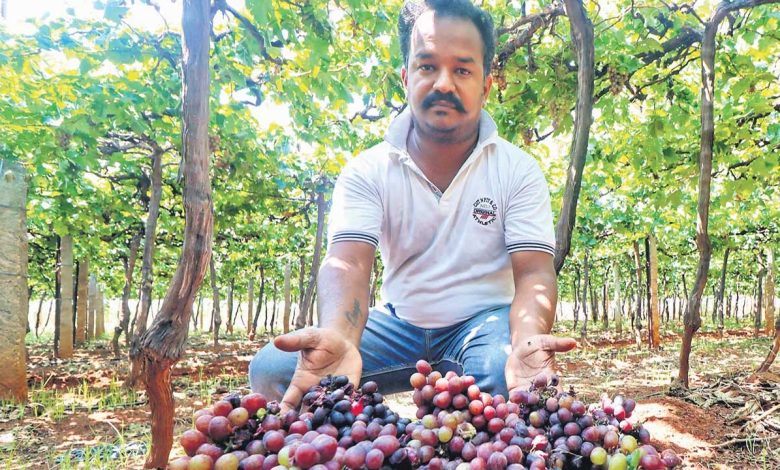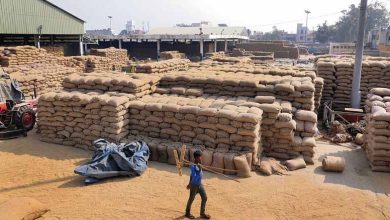Tamil Nadu in grape farmers for season It’s a sour

THENI: On the Cumbam-Kumily national highway, the vineyards have lost their luscious vibe. The unprecedented rise in temperature has left the valley parched and the ‘grapes city of south India’ lies in a shambles. The past month has been horrible for grape farmers of Tamil Nadu as the heatwave aborted the flowers, which will have a huge impact on the yield of the fruit this year. Instead of the usual 12 to 15 tonnes per acre, the farmers are expecting two to three tonnes this season, marking almost 80% fall in the yield.
Theni is one of the largest producers of Muscat Hamburg (panneer thiratchai) — a grape variety extremely popular among farmers because of its quick growth. In contrast to other fruits, this variety of grape is available in the market throughout the year.
Fertile soil and availability of water are the only requirements for the enhanced flavour of the fruit, largely used to make the best of wines, jams, and raisins. Nearly 90% of the state’s panneer thiratchai cultivation is in Cumbum valley of Theni, while the remaining 10% is at Kodai Road in Dindigul and in parts of Coimbatore district.
Apart from panneer thiratchai, Odaipatti area in Theni district is popular for its varieties of seedless grapes. Interestingly, seedless grapes are grown only in this area of the state.
Farmers of both panneer thiratchai and seedless grapes are in distress as heavy loss is expected this year due to poor yield.
Periyar Vaigai Irrigation Farmers Association president and Kaamayam Thiratchai Vivasayigal Sangam coordinator Pon Katchi Kannan told TNIE that over 300 farmers in Cumbum valley cultivate panneer thiratchai in around 5,000 acres. “It is past the flowering season now but only a few flowers have turned into fruits due to extreme heat.
“A large number of flowers fail to get pollinated as mercury levels hit upto 38 degree Celsius here. It’s harvesting time in just two months and farmers are expecting around two tonnes per acre instead of the usual 12 tonnes. Whatever be the difference in total yield, the cost of production, around Rs 1.10 lakh per acre, remains the same.
Like paddy and sugarcane, the government must provide a minimum support price of Rs 50 per kg to grapes as well to prevent huge loss. Crop loss relief must also be provided to grape farmers,” he said.
According to Odaipatti Seedless Grapes Farmers Producers Group director S Kalanidhi, over 200 farmers cultivate seedless grapes in 1,000 acres of land in the area. “Sunny and dry climate is suitable for this one-year crop, which is harvested in September. Now, the grapes are getting directly exposed to ultraviolet rays, leading to increased abortion of flowers, crack, rot infection, and total dry out,” he said.
He further said that usually farmers spend around Rs 1.5 lakh per acre as cost of production, and yield will nearly be 10 to 15 tonnes per acre. “However, this year, the yield would reduce to around three tonnes. During pre-budget, officials asked for our demands, based on which they arranged a mini weather station on a trial basis.
However, there was no announcement to extend the weather station. The government recently announced its plans to procure a Geographical Indication (GI) tag for Odaipatti seedless grapes. The move would bring export opportunities but this season looks bleak for the farmers,” he added.
He alleged that though there is a grape research centre in the district, it is of no use for the farmers. “Weather stations have been set up by spending crores but most of the time the machines are not working. There is a private wine factory in the district but they procure grapes from Karnataka at Rs 5 per kg. The GI tag for panneer thiratchai did not do any wonders for the farmers here,” he said.
Arockiasamy, a farmer from Kodai Road, said over 100 farmers cultivate panneer thiratchai in Chinnalapatti and Vellode at around 1,000 acres. “Due to the extreme weather conditions, flowers in the grape bunch started falling down and they failed to convert as fruit. At present, farmers get an average Rs 45 per kg, which is expected to continue. But this won’t make up for our heavy loss,” he said.
Deputy director of Horticulture C Prabha refuted farmers’ grievances and said it is essential to change crop type for sustainable growth. She, however, assured to look into the issue.





